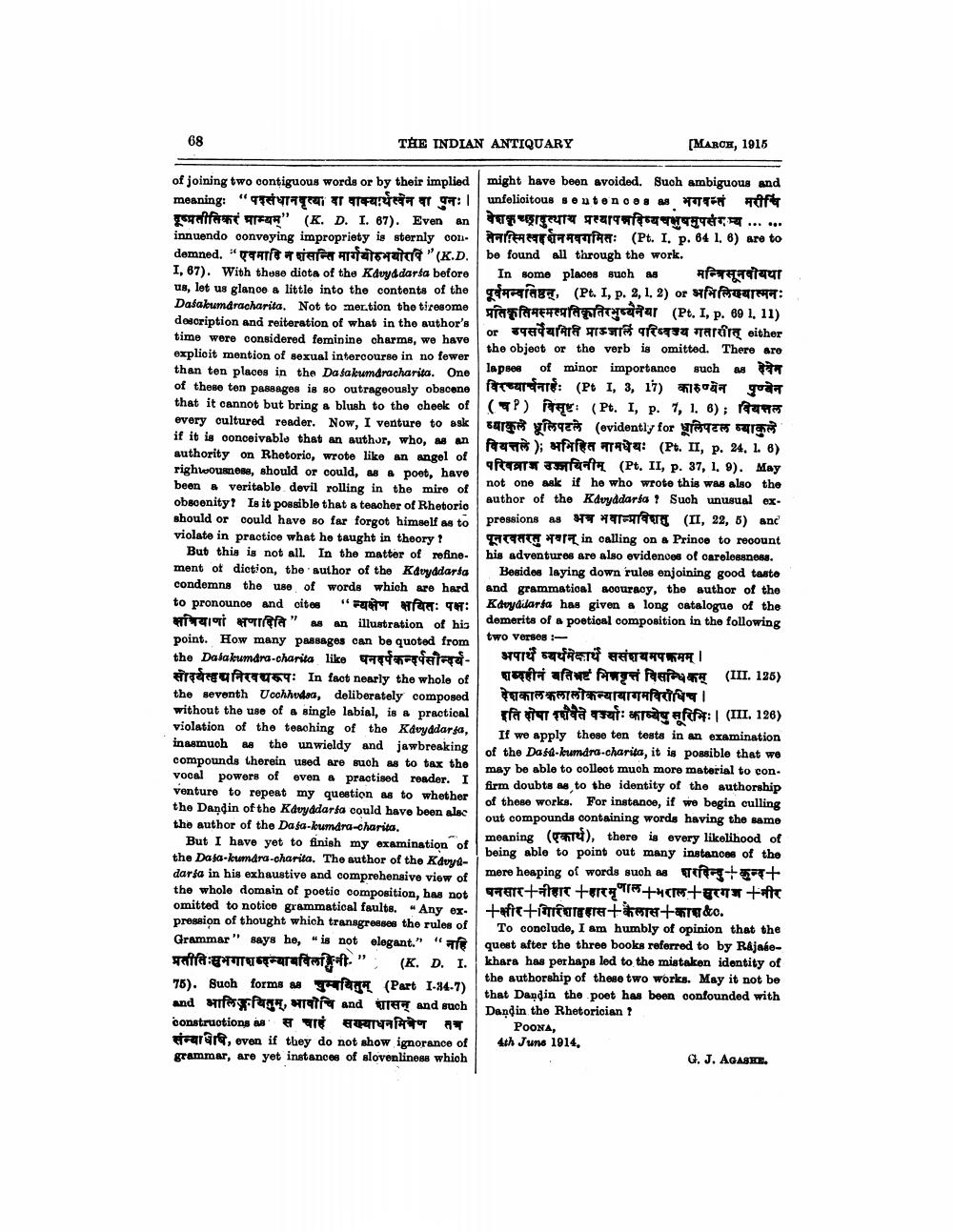________________
68
THE INDIAN ANTIQUARY
[MARCE, 1915
of joining two contiguous words or by their implied might have been avoided. Such ambiguous and meaning: " TRUTT TURUNT : unfelioitous sentences as TT of gewelfara' " (K. D. I. 67). Even an g ry gear aftur
...... innuendo convoying impropriety is sternly con. A TOTA : (Pt. I. p. 64 1. 6) are to demned. "TATT AF Arafata total "(K.D. be found all through the work. I, 67). With those diota of the Kdvyddarsa before | In some places such as मन्त्रिसूनवीयथा un, let us glanco a little into the contents of the g arage, (Pt. I, p. 2, 1, 2) or form: Dašakumdracharita. Not to mer.tion the tiresome
prafata terpancanar (Pt. I, p. 69 1. 11) description and reiteration of what in the author's
or qarata e f u Taring either time were considered feminine charms, we have
the object or the verb is omitted. There are explicit mention of sexual intercourse in no fewer than ten places in the Da sakumdracharita. One
lapse of minor importance such as 47 of these ten passages is so outrageously obscene
freerae: (Pt I, 3, 17) 18 goala that it cannot but bring a blush to the cheek of ( P) : (Pt. I, p. 7, 1. 6); ratas every cultured reader. Now, I venture to ask Er** gleza (evidently for yes sig if it is conceivable that an author, who, as an
fo ); fafea : (Pt. II, p. 24. 1. 8) authority on Rhetorio, wrote like an angel of
QUAT faftu (Pt. II, p. 37, 1. 9). May righwousness, should or could, 4.8 & poet, have been & veritable devil rolling in the mire of
not one ask if he who wrote this was also the obsoonity! Is it possible that a teacher of Rhetorio
author of the Kdvyddarsa ! Such unusual oxshould or could have so far forgot himself as to
pressions as T V (II, 22, 5) and violate in practice what he taught in theory ! E T TI in calling on a Princo to recount
But this is not all. In the matter of refine- his adventures are also evidences of oarelessness. ment of diction, the author of the Kdvyddarta Besides laying down rules enjoining good taste condemns the use of words which are hard and grammatioal socuracy, the author of the to pronounce and oitos "F T MEGT: TH: Kavydilarda has given a long catalogue of the HTTO ATOR" M an Istration of his demerits of a poetioal composition in the following point. How many passages can be quoted from
two verses :the Dalakumara charita like arrate
अपाय व्यर्थमेकार्थ ससंशयमपक्रमम् । सौदर्यहपनिरवयरूप: In taot nearly the whole of
Toru afar we fwyafa (III. 126) the seventh Ucchhudoa, deliberately composed T
atararafering without the use of a single labial, is a practical
da Tat: okrąg aftft: (III. 126) violation of the teaching of the Kavyddarsa, If we apply these ten tests in an examination inasmuch as the unwieldy and jawbreaking
of the Dasa-kumara.charita, it is possible that we compounds therein used are such as to tax the
may be able to collect much more material to con. vocal powers of even a practised reader. I venture to repeat my question as to whether
firm doubts as to the identity of the authorship
of these works. For instance, if we begin culling the Dandin of the Kavyddar fa could have been elec
out compounds containing words having the same the author of the Dafa-kumdra-charita. But I have yet to finish my examination of
meaning (Caru), there is every likelihood of the Daja-kumara charita. The author of the Kdvyd
being able to point out many instances of the darja in his exhaustive and comprehensive view of
mere heaping of words such as शरदिन्दु+कुन्द+ the whole domain of poetic composition, has not ye+alert +re +C a r +fre omitted to notice grammatical faults. "Any ext reta OTTETE+ME+ &o. proasion of thought which transgressee the rules of To conclude, I am humbly of opinion that the Grammar" says ho, "is not elegant." "af quest after the three books referred to by RajaseHaifa U raraferi ff.” (K. D. I.
khara has perhaps led to the mistaken identity of 76). Buch forms as a
the authorship of these two works. May it not be (Part I-84-7)
that Dandin the poet has been confounded with and भालिजयितुम्, भावोचि and शासन् and such
Dandin the Rhetorician ? constructions as ERNAHTAY
POONA, rarar, even if they do not show ignorance of 4th Juno 1014. grammar, are yet instances of slovenliness which
G. J. AGASEE.




